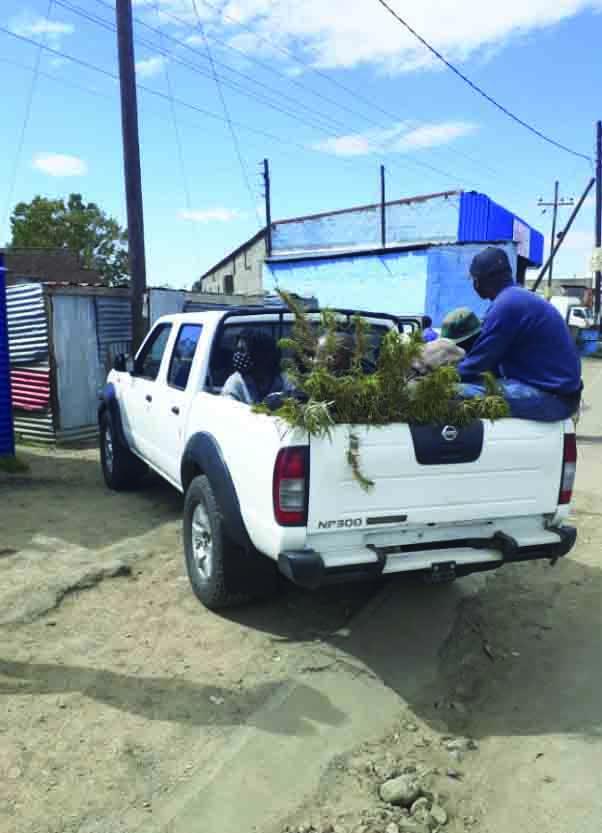Africa-Press – Lesotho. POLICE have embarked on a crackdown to raid streets of drug peddlers in an operation that has netted more than two dozen people so far. Many of the targeted dealers sell drugs such as marijuana and cocaine on the streets alongside regular items such as corn chips, fruits and vegetables.
So far 24 street vendors have been arrested and 22 of them appeared before the Maseru Magistrates’ Court last week charged with illegal possession of drugs after allegedly being found with stocks of marijuana.
The other two were found in possession of suspected cocaine. Police say they have taken the substance to a lab for testing. The latest crackdown was triggered by a tip-off to the police that some street vendors were dealing in drugs while pretending to be selling regular goodies such as food items.
For example, a vendor arrested along Kingsway Road and another at the Moshoeshoe I Statue Park openly displayed fruits for sale on their tables. They had allegedly stashed the drugs under their tables.
Police sources say some beauty and hair salons could also be selling drugs, with the hair business just being a front. “There are many such businesses and we have discovered that some are serious distributors of drugs,” one of the police sources said.
“Our investigations have revealed that drugs are bought from the street vendors who sell the drugs in small quantities,” deputy police spokesperson Sub-Inspector ’Mareabetsoe Mofoka said.
Sub-Insp Mofoka said more work needs to be done to unearth people who supply the street vendors with the drugs. “Dagga is packed in small packages called jointers wrapped in paper,” she said.
Youths are the major clients, said Sub-Inspector ’Mareabetsoe Mofoka. Apart from the raids, police have also embarked on a massive awareness campaign to sensitise youths about the dangers of substance abuse.
The awareness campaigns include visiting schools and talking to students, she said. “It is unfortunate that youths use their pocket money to buy drugs instead of their schooling materials,” said Sub-Inspector ’Mareabetsoe Mofoka.
She said after taking the drugs, the youths usually go on to commit “heinous crimes” such as murder. Sub-Inspector Mofoka said police are also moving into villages adjacent to the city in search of drug peddlers and growers.
Sources say almost all the youths called Manomoro (a general name for gangsters who classify themselves according to their tattooed numbers) held by the army at the Makoanyane Barracks are known to abuse drugs.
So far the army has held 65 youths, including two girls aged between 15 and 34 at the barracks for terrorising residents in Koalabata, Naleli, Khubetsoana, Qoaling and other areas in Maseru.
A source said there is now a tendency by the youths to mix a cough syrup called DPH with fizzy drinks to concoct a drug that leaves one high for long periods of time.
“This drug is easy to make but keeps the youths high,” the source said.
“It is mostly used by school-going children who sip it using energy drink bottles while putting on their uniforms,” he said. Police say they have also noticed that some now have illegal plantations of dagga in the backyards of their homes.
The manager of the Diamonds and Drugs Unit at the police headquarters, Superintendent Retšelisitsoe Bokopane, said they were worried by the widespread abuse of drugs amongst youths.
Supt Bokopane said some of the children arrested by police disclosed that they commit crimes under influence of drugs. “They told us that they get courage to even kill a person when under the influence of drugs.
It’s going out of hand,” Supt Bokopane said. “Crime is becoming worrisome…as the police we need to roll up our sleeves to fight it,” said Supt Bokopane. He said the crackdown was already showing positive results, citing a decline in crime.
The maximum sentence that has been handed down to those convicted under the Drug Abuse Act during the ongoing crackdown is a M10 000 fine or five-year imprisonment, while the lowest sentence has been a M500 fine.
The Act stipulates a prison sentence of up to five years and/or a fine of not less than M20 000. The Organised Crime Index 2020 states that Lesotho is still a small market for hard drugs such as heroin and cocaine.
This is due to the high price of cocaine and also because Lesotho is mainly a transit country for heroin intended for the more lucrative South African market.
However, it has warned of reports that the heroin market in Lesotho is growing. Marijuana, the main substance grown and used in Lesotho is mainly grown by rural people who don’t view their activities as illegal.
Instead, they see marijuana farming as a source of livelihood, according to a study published in the Journal of Political Ecology. One of the chiefs in Lesotho who was interviewed for the research readily admitted to asking the police to be lenient on cannabis farmers in the Mapoteng area, an area notorious for dagga farming.
The study, published 10 years ago, suggests that with large sections of the rural population dependent on income from marijuana, a tough stance against marijuana farming could lose votes for politicians.
For More News And Analysis About Lesotho Follow Africa-Press






